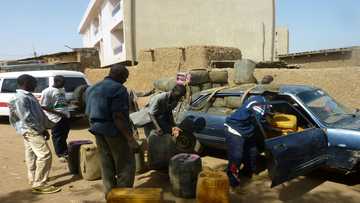Venezuela torture victim uses VR to shed light on infamous prison

Source: AFP
Cries of pain ring out from the dark hallways and cramped cells, punctuated by the sound of electric shocks.
Wearing headsets and sensors, viewers encounter such grim scenes on a virtual "visit" to one of Venezuela's most notorious prisons, El Helicoide, in Caracas.
The VR event Helicoide Reality, featuring the testimony of 30 survivors of torture by Venezuela's intelligence services, has been presented in 17 countries.
Among its viewers is Piotr Hofmanski, president of the International Criminal Court, which is investigating possible crimes against humanity committed under the government of President Nicolas Maduro.
"We are looking for decision-makers to promote the closure of torture centers. We want El Helicoide to be closed," said Victor Navarro, director of the NGO that developed the project, Voces de la Memoria (Voices of Memory).
Navarro knows about El Helicoide firsthand. The 27-year-old, now a refugee in Buenos Aires, was imprisoned there for five months in 2018.
He suspects it was for his activism: he took care of street youths during anti-Maduro protests the year before that left more than 120 dead.
"I was a witness and a victim of torture during my time. They put a gun in my mouth (during an interrogation), loaded, with the safety off... They beat me," he told AFP.
"I was doing social work, and they said I had created a terrorist cell financed by the United States," Navarro said.
From a mall to a prison

Source: AFP
Navarro was freed in 2018 along with dozens of others as part of negotiations between the government and the political opposition. He then fled the country.
He now has links with Washington, as Helicoide Reality was supported by the National Endowment for Democracy, a foundation primarily financed by the US government.
Of the 286 political prisoners in Venezuela, 63 are thought to be held in El Helicoide, according to the NGO Foro Penal.
The massive building, with its spiral passages that converge to form an enormous dome, was meant to be a groundbreaking architectural gem when construction started in the 1950s.
But the futuristic mall and commercial center was never inaugurated. It was left largely empty and abandoned for decades, until it was converted into a prison for the Bolivarian National Intelligence Service (SEBIN).
Venezuelan authorities deny that crimes against humanity have occurred there, and accuse the ICC of weaponizing international law for political ends.
The Venezuelan public prosecutor's office also rejects accusations of torture, and points to the hundreds of military and police officers convicted for human rights violations as proof the justice system works properly.

Source: AFP
Maduro recently declared El Helicoide a "moral reference," receiving a small model of the building as a gift.
Navarro, for his part, wrote a book about his time in the prison. But he found that words weren't enough to convey the hell he lived through.
After discovering a virtual reality program based on Anne Frank's famous diary of living under Nazi occupation, he knew what he wanted to do.
Like a cockroach

Source: AFP
Users virtually exploring El Helicoide find themselves plunged into the prison's dark passageways. A police officer, clad in black, follows them around, wherever they go.
They hear voices: testimony from politicians but also ordinary people: a dancer, a sports teacher.
"Anyone who thinks differently from the government can be victims," Navarro says.
And not everything is virtual: the cries of pain, in between the electric shocks, are real, recorded by a prisoner who secretly had a cellphone.
At one point, the virtual visitor is surrounded by cockroaches, and gradually shrinks until he reaches the size of the insect -- an idea born from prisoner interviews.
"(When you are detained) you are given the impression of being a cockroach," says Navarro. Torture, he says, is dehumanizing that way.
The experiences in Helicoide Reality match testimonies given to the ICC: Electric shocks to the testicles or suffocation with plastic bags are reported to be common at the prison, while many women report rape.
The memories are painful -- and are also still being made, Navarro points out.
"The hardest thing is that in Venezeula, the torture continues."
New feature: Сheck out news that is picked for YOU ➡️ click on “Recommended for you” and enjoy!
Source: AFP





